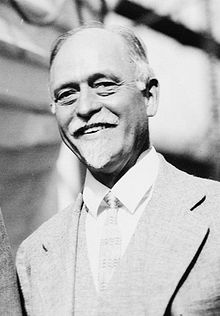The persistence of a traditional press corp still unable to do their fact checking on the Wikipedia has induced the 'Creditanstalt' to issue the following press release with more extensive details about the qualifications of the members of our Monetary Advisory Committee.
Distinguished Members of the 'Creditanstalt' Monetary Advisory Committee: Snidpet Biographies, Part I
Eugen von Böhm-Bawerk (1851 – 1914)
A recent resurrection from the grave to our committee, Böhm-Bawerk, like Schumpeter, was Austrian Finance Minister intermittently from 1895 until 1904. His legacy as finance minister is disputed: while economic historian Alexander Gerschenkron criticized his "penny pinching, 'not-one-heller-more-policies'," and lays much of the blame for Austria's economic backwardness on Böhm-Bawerk's unwillingness to spend heavily on public works projects, Joseph Schumpeter praised Böhm-Bawerk's efforts toward "the financial stability of the country." Thus his main claim to membership in the committee must remain the fact that his visage is the only one to have graced an actual banknote (the Austrian 100 Schilling):
His theory of capital emphasized "roundaboutness" as a source of increasing wealth, and he was a fierce critic of the labor-theory-of-value foundations of Marxism. He has been called Austria's second greatest economist after von Mises by George Reisman, who also states that von Mises would have considered him the greatest (so much for the consistency of preferences).
Friedrich von Hayek (1899 – 1992)
Friedrich von Hayek was the greatest advocate of the liquidationist school of business cycle theory. He received the Nobel Prize in Economics in 1974. Building on his Viennese colleague Böhm-Bawerk's (see entry above) concept of the "average period of production," Hayek blamed the business cycle on excessive investment in the expansion phase due to the inflationary effect of too low interest rates set by the central bank, followed by a period of 'liquidation' to eliminate redundant business enterprises and capital. Until the natural purgative of liquidation had been completed, he argued, the economy could not revive. This strongly influenced policymaking at the time, particularly the US Treasury Secretary under Hoover, Andrew Mellon, and had strong connotations of self-flagellating penance for previous profligacy, an attitude well known in the Judeo-Christian moral tradition.
In contrast, his principle nemesis Keynes considered a deep depression to be simply analogous to a broken magneto in a car which should be repaired according to the best engineering practice and not moralized about and accepted as unavoidable fate. Thus in Hayek's view, presumably, the Great Depression of the 1930s was caused by excessive investment in railroads and vaudeville theaters in the 1920s, and could not be overcome until these had been driven into bankruptcy and scrapped by the depression to make way for automobiles, airplanes, radio, TV and the talkies (his fellow Austrian capital-theorist Schumpeter might have put the causality the other way around).
In the event, the railroads did not need to be scrapped (although the same could not be said of the vaudeville halls), and recovery in the 1930s was driven quite effectively by the ultimate inflationary liquidationist investment – armaments (and to a lesser extent civilian infrastructure and housing).
Hayek has subsequently become the darling of both right-wing libertarian thinkers and naive believers in the self-organizational information processing capabilities of unfettered markets.
 Fisher has been called "the greatest economist the United States has ever produced" for his famous 1929 prediction just before Black Friday that the stock market had reached "a permanently high plateau" (which was undoubtedly much more accurate than Glassman and Hassett's similar 1999 prediction of "Dow 36,000" – the 'Creditanstalt' places a high value on the accuracy of economic forecasts!). In contrast to modern bonus-guaranteed bankers (and like Schumpeter, see below), he had skin in the game and subsequently lost most of his substantial personal wealth. He made amends with his 1933 theory of debt deflation, though this was eclipsed by Keynes' General Theory (which seems strangely fitting for a theory of deflation). He brought the quantity theory of money up to date, and made major contributions to general-equilibrium (including an innovative design for a nifty hydraulic analog app) and capital theory (e.g., contesting Böhm-Bawerk's theory of "roundaboutness," see above, a critique that later received support from Paul Samuelson).
Fisher has been called "the greatest economist the United States has ever produced" for his famous 1929 prediction just before Black Friday that the stock market had reached "a permanently high plateau" (which was undoubtedly much more accurate than Glassman and Hassett's similar 1999 prediction of "Dow 36,000" – the 'Creditanstalt' places a high value on the accuracy of economic forecasts!). In contrast to modern bonus-guaranteed bankers (and like Schumpeter, see below), he had skin in the game and subsequently lost most of his substantial personal wealth. He made amends with his 1933 theory of debt deflation, though this was eclipsed by Keynes' General Theory (which seems strangely fitting for a theory of deflation). He brought the quantity theory of money up to date, and made major contributions to general-equilibrium (including an innovative design for a nifty hydraulic analog app) and capital theory (e.g., contesting Böhm-Bawerk's theory of "roundaboutness," see above, a critique that later received support from Paul Samuelson).
Fisher was also a strong believer in the "focal sepsis" theory of physician Henry Cotton (as well as eugenics, prohibition, and Kelogg's vegetarianism and fecal analysis – NSA-SWIFT take note!) and had numerous sections of his schizophrenic daughter Margaret's bowel and colon removed in Cotton's clinic, eventually resulting in her death (see Madhouse: A Tragic Tale of Megalomania and Modern Medicine by Andrew Scull) – another confirmation of Keynes' dictum that "Madmen in authority, who hear voices in the air, are distilling their frenzy from some academic scribbler of a few years back. I am sure that the power of vested interests is vastly exaggerated compared with the gradual encroachment of ideas."
Schumpeter established his monetary credentials during a brief stint as Austrian Finance Minister in 1919 at the onset of the hyperinflation, and as president of the private Biedermann Bank, whose bankruptcy in 1924 also ruined him personally, forcing him to take day jobs at such provincial universities as Bonn and Harvard. His great ambition in life was to be the world's best economist, best horseman, and best lover, but to this day there is still no consensus about which if any he achieved. He turned the liquidationist school (see Hayek entry) on its head by declaring "creative destruction" to be the paramount disequilibrium virtue of capitalism. He was highly influenced by and a secret admirer of Marx (whether Groucho, Chico or Karl is unclear) and Charlie Chaplin in The Great Dictator. But he was also a great detractor of Keynes, whom he never forgave for overshadowing him as a lover (at least according to Niall Ferguson) and financial speculator (horsemanship was apparently no contest).
Part II of Snidpets of Economic Biography will appear shortly and cover the remaining members of the 'Creditanstalt' Monetary Advisory Committee:
Michael Kalecki (1899 – 1970)
John Maynard Keynes (1883 – 1946)
Carl Menger (1840 – 1921)
Ludwig von Mises (1881 – 1973)
Oscar Morgenstern (1902 – 1977)
John von Neumann (1903 – 1957)
*The word "snidpet" is a neologism amalgamating the two words "snide" and "snippet" (Snidpet = Snide + Snippet), and is hereby copylefted © by the 'Creditanstalt,' Anstalt des öffentlichen Aborts.
Hayek has subsequently become the darling of both right-wing libertarian thinkers and naive believers in the self-organizational information processing capabilities of unfettered markets.
Hayek's best-known book is The Autobahn to Sausagedom (1944; 1955 American edition: The Interstate to Obesity), where he denounced central planning (the "nanny state") as incompatible with individual freedom of waistlines. It was a major influence on Milton Friedman's 1980 bestseller Free to Lose (UK Margaret-Who? edition: Free to Gain, often erroneously cited as Free to Maim), who otherwise thought Hayek's Prices and Production a very flawed book and his Pure Theory of Capital unreadable.
Irving Fisher (1867 – 1947)
 Fisher has been called "the greatest economist the United States has ever produced" for his famous 1929 prediction just before Black Friday that the stock market had reached "a permanently high plateau" (which was undoubtedly much more accurate than Glassman and Hassett's similar 1999 prediction of "Dow 36,000" – the 'Creditanstalt' places a high value on the accuracy of economic forecasts!). In contrast to modern bonus-guaranteed bankers (and like Schumpeter, see below), he had skin in the game and subsequently lost most of his substantial personal wealth. He made amends with his 1933 theory of debt deflation, though this was eclipsed by Keynes' General Theory (which seems strangely fitting for a theory of deflation). He brought the quantity theory of money up to date, and made major contributions to general-equilibrium (including an innovative design for a nifty hydraulic analog app) and capital theory (e.g., contesting Böhm-Bawerk's theory of "roundaboutness," see above, a critique that later received support from Paul Samuelson).
Fisher has been called "the greatest economist the United States has ever produced" for his famous 1929 prediction just before Black Friday that the stock market had reached "a permanently high plateau" (which was undoubtedly much more accurate than Glassman and Hassett's similar 1999 prediction of "Dow 36,000" – the 'Creditanstalt' places a high value on the accuracy of economic forecasts!). In contrast to modern bonus-guaranteed bankers (and like Schumpeter, see below), he had skin in the game and subsequently lost most of his substantial personal wealth. He made amends with his 1933 theory of debt deflation, though this was eclipsed by Keynes' General Theory (which seems strangely fitting for a theory of deflation). He brought the quantity theory of money up to date, and made major contributions to general-equilibrium (including an innovative design for a nifty hydraulic analog app) and capital theory (e.g., contesting Böhm-Bawerk's theory of "roundaboutness," see above, a critique that later received support from Paul Samuelson).Fisher was also a strong believer in the "focal sepsis" theory of physician Henry Cotton (as well as eugenics, prohibition, and Kelogg's vegetarianism and fecal analysis – NSA-SWIFT take note!) and had numerous sections of his schizophrenic daughter Margaret's bowel and colon removed in Cotton's clinic, eventually resulting in her death (see Madhouse: A Tragic Tale of Megalomania and Modern Medicine by Andrew Scull) – another confirmation of Keynes' dictum that "Madmen in authority, who hear voices in the air, are distilling their frenzy from some academic scribbler of a few years back. I am sure that the power of vested interests is vastly exaggerated compared with the gradual encroachment of ideas."
Schumpeter established his monetary credentials during a brief stint as Austrian Finance Minister in 1919 at the onset of the hyperinflation, and as president of the private Biedermann Bank, whose bankruptcy in 1924 also ruined him personally, forcing him to take day jobs at such provincial universities as Bonn and Harvard. His great ambition in life was to be the world's best economist, best horseman, and best lover, but to this day there is still no consensus about which if any he achieved. He turned the liquidationist school (see Hayek entry) on its head by declaring "creative destruction" to be the paramount disequilibrium virtue of capitalism. He was highly influenced by and a secret admirer of Marx (whether Groucho, Chico or Karl is unclear) and Charlie Chaplin in The Great Dictator. But he was also a great detractor of Keynes, whom he never forgave for overshadowing him as a lover (at least according to Niall Ferguson) and financial speculator (horsemanship was apparently no contest).
Part II of Snidpets of Economic Biography will appear shortly and cover the remaining members of the 'Creditanstalt' Monetary Advisory Committee:
Michael Kalecki (1899 – 1970)
John Maynard Keynes (1883 – 1946)
Carl Menger (1840 – 1921)
Ludwig von Mises (1881 – 1973)
Oscar Morgenstern (1902 – 1977)
John von Neumann (1903 – 1957)
*The word "snidpet" is a neologism amalgamating the two words "snide" and "snippet" (Snidpet = Snide + Snippet), and is hereby copylefted © by the 'Creditanstalt,' Anstalt des öffentlichen Aborts.

















